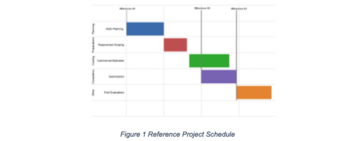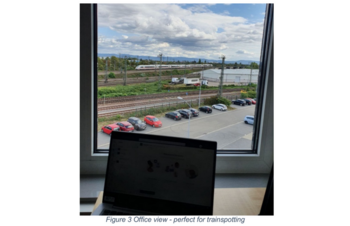Alexander Ng (Sustainable Design & Construction) | German Railway Network Logistics (MEV Eisenbahn-Verkehrsgesellschaft mbH (MEV))
Alexander Ng (Sustainable Design & Construction) | German Railway Network Logistics (MEV Eisenbahn-Verkehrsgesellschaft mbH (MEV))

I was very privileged to be a recipient of the Graduate Research and Internship Program (GRIP) fellowship sponsored by The Europe Center and the Stanford Club of Germany during the summer of 2022. As an advocate for sustainable railway transport systems, I was motivated to pursue these interests abroad in Germany, which not only has an extensive railway network in place but has also committed to expand and improve on its existing infrastructure through increased rail investments. The award is a fantastic platform for me to witness these exciting developments first-hand in a German railway firm and the GRIP administration team rendered phenomenal support throughout the full duration of the program. Although I encountered some hiccups with my initial placement company (due to unexpectedly strict intern hiring policies at my original placement firm), this led to an equally exciting opportunity with MEV Eisenbahn-Verkehrsgesellschaft mbH (MEV), a German railway service provider based in Mannheim.
Work at MEV
My internship at MEV offered many excellent insights into the German rail industry as the company supports a broad spectrum of clients including passenger rail and freight operators in the provision of rail logistics and traffic operational support services. Despite my poor command of Deutsch and inherent unfamiliarity with German railways, I was entrusted by Mr. Marc Giesen, Chief Executive of MEV, to be responsible for two key project portfolios:
International Rail Tender
One of MEV’s core businesses include the provision of competent train drivers that are certified to operate different train types and categories on the German railway network such as passenger or freight services. For this project, I was tasked to lead the firm’s efforts in preparing a high-quality proposal that met the tender requirements and specific needs of a high-speed passenger rail operator offering cross-border rail services. My responsibilities included the overall project management of the entire bid proposal and working with departments across MEV such as engineering, corporate and legal practitioners to deliver a holistic, well-integrated proposal that fulfilled the client’s objectives of achieving greater rail connectivity within the EU.

At the end of my internship, I supported the team in submitting a comprehensive bid proposal for the tender that outlined MEV’s intrinsic value as a collaborative partner. I drafted a project plan to organize the company’s efforts internally, working with colleagues who were best placed to tackle specific requirements within the stipulated tender timelines. My role in coordinating the entire bid process beginning with conception through submission allowed me to appreciate organizational development in a German railway firm from different perspectives and also practice project skillsets that are essential for effective construction management such as scheduling and scope development to administer concurrent workstreams seamlessly.
Strategic Rail Asset Investment
Apart from international bids, I was privileged to support MEV’s business development plans. Rail assets in Europe are receiving increasing attention from financial institutions as attractive instruments that can accelerate the transition towards greener investment portfolios. In this project, I was responsible for assessing the business potential for MEV’s involvement in such asset investments across the near to long term. This exciting role allowed me to work with external European investment partners and was an excellent platform for me to apply green financing principles from my Sustainable Design and Construction Masters program in a practical setting. For instance, I studied how ESG screening criteria could be adopted for greenfield investments and EU taxonomy regulations would be interpreted in the specific context of railway applications.
My deliverables include devising an implementation strategy that aligns the differing needs of multiple stakeholders such as asset owners, operators, advisors and investors. The development process required me to dig deeper into the backgrounds for each entity to better address their underlying concerns and ensure that their specific interests were adequately captured in my proposal. One such example is the need to balance the asset owners’ inclination for higher returns upfront against the intermediate to long term approach advocated by investment advisors. Working through this process demonstrated that pursuing inclusive strategies can foster more equitable outcomes across the entire value chain and built my confidence in structuring better, more sustainable projects.
Navigating in German

While the internship experience at MEV certainly stimulated professional development in many ways, the opportunity to immerse myself in an entirely German cultural environment where English is not the native language is what differentiates the GRIP fellowship from other programs. The initial communication struggle was real as I quickly found out that English is not commonly spoken as a second language in the German rail industry and many operations personnel (i.e. train drivers, dispatch officers) spoke Russian instead because that was taught in the former East Germany.
Nevertheless, my colleagues and peers were extremely patient in accommodating my linguistic limitations and provided the space for me to build proficiency at my own pace, to the extent that I was able to communicate through halting and grammatically imperfect German at the end of my internship. This humbling experience has not only encouraged me to be more empathetic towards non-native English users but also molded me to be a better listener so that I have a fuller understanding for what was being communicated.

Post Reflection
Looking back on my GRIP experience, I learned that being sincere in your efforts to communicate in the local language (even if ridiculously poor) is always appreciated and goes a long way towards forging stronger interpersonal relationships. Conversations with my colleagues and peers also highlighted characteristics peculiar to German working culture such as setting boundaries between work and personal affairs or looking forward to the next ‘Pause’, ‘Feierabend’ and ‘Urlaub’ (which refers to work break, end of workday and vacation respectively).
